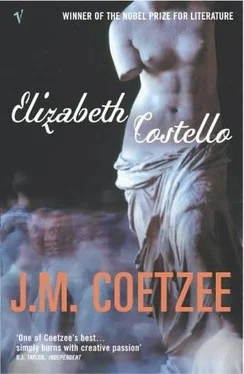J. Coetzee - Elizabeth Costello
Здесь есть возможность читать онлайн «J. Coetzee - Elizabeth Costello» весь текст электронной книги совершенно бесплатно (целиком полную версию без сокращений). В некоторых случаях можно слушать аудио, скачать через торрент в формате fb2 и присутствует краткое содержание. Жанр: Современная проза, на английском языке. Описание произведения, (предисловие) а так же отзывы посетителей доступны на портале библиотеки ЛибКат.
- Название:Elizabeth Costello
- Автор:
- Жанр:
- Год:неизвестен
- ISBN:нет данных
- Рейтинг книги:3 / 5. Голосов: 1
-
Избранное:Добавить в избранное
- Отзывы:
-
Ваша оценка:
Elizabeth Costello: краткое содержание, описание и аннотация
Предлагаем к чтению аннотацию, описание, краткое содержание или предисловие (зависит от того, что написал сам автор книги «Elizabeth Costello»). Если вы не нашли необходимую информацию о книге — напишите в комментариях, мы постараемся отыскать её.
For South African writer J.M. Coetzee, winner of two Booker Prizes and the 2003 Nobel Prize for Literature, the world of receiving literary awards and giving speeches must be such a commonplace that he has put the circuit at the center of his book, Elizabeth Costello. As the work opens, in fact, the eponymous Elizabeth, a fictional novelist, is in Williamstown, Pennsylvania, to receive the Stowe Award. For her speech at the Williamstown's Altona College she chooses the tired topic, "What Is Realism?" and quickly loses her audience in her unfocused discussion of Kafka. From there, readers follow her to a cruise ship where she is virtually imprisoned as a celebrity lecturer to the ship's guests. Next, she is off to Appleton College where she delivers the annual Gates Lecture. Later, she will even attend a graduation speech.
Coetzee has made this project difficult for himself. Occasional writing-writing that includes graduation speeches, acceptance speeches, or even academic lectures-is a less than auspicious form around which to build a long work of fiction. A powerful central character engaged in a challenging stage of life might sustain such a work. Yet, at the start, Coetzee declares that Elizabeth is "old and tired," and her best book, The House on Eccles Street is long in her past. Elizabeth Costello lacks a progressive plot and offers little development over the course of each new performance at the lectern. Readers are given Elizabeth fully formed with only brief glimpses of her past sexual dalliances and literary efforts.
In the end, Elizabeth Costello seems undecided about its own direction. When Elizabeth is brought to a final reckoning at the gates of the afterlife, she begins to suspect that she is actually in hell, "or at least purgatory: a purgatory of clichés." Perhaps Coetzee's Elizabeth Costello, which can be read as an extended critique of clichéd writing, is a portrait of this purgatory. While some readers may find Coetzee's philosophical prose sustenance enough on the journey, some will turn back at the gate. -Patrick O'Kelley
From Publishers Weekly
Even more uncompromising than usual, this latest novel by Coetzee (his first since 1999's Booker Prize-winning Disgrace) blurs the bounds of fiction and nonfiction while furthering the author's exploration of urgent moral and aesthetic questions. Elizabeth Costello, a fictional aging Australian novelist who gained fame for a Ulysses-inspired novel in the 1960s, reveals the workings of her still-formidable mind in a series of formal addresses she either attends or delivers herself (an award acceptance speech, a lecture on a cruise ship, a graduation speech). This ingenious structure allows Coetzee to circle around his protagonist, revealing her preoccupations and contradictions her relationships with her son, John, an academic, and her sister, Blanche, a missionary in Africa; her deep, almost fanatical concern with animal rights; her conflicted views on reason and realism; her grapplings with the human problems of sex and spirituality. The specters of the Holocaust and colonialism, of Greek mythology and Christian morality, and of Franz Kafka and the absurd haunt the novel, as Coetzee deftly weaves the intense contemplation of abstractions with the everyday life of an all-too-human body and mind. The struggle for self-expression comes to a wrenching climax when Elizabeth faces a final reckoning and finds herself at a loss for words. This is a novel of weighty ideas, concerned with what it means to be human and with the difficult and seductive task of making meaning. It is a resounding achievement by Coetzee and one that will linger with the reader long after its reverberating conclusion.












